 ΑΠΟΛΥΤΡΩΣΙΣ
ΧΡΙΣΤΙΑΝΙΚΗ ΟΡΘΟΔΟΞΗ ΑΔΕΛΦΟΤΗΣ
ΑΠΟΛΥΤΡΩΣΙΣ
ΧΡΙΣΤΙΑΝΙΚΗ ΟΡΘΟΔΟΞΗ ΑΔΕΛΦΟΤΗΣ
Super User
1b. Conscience
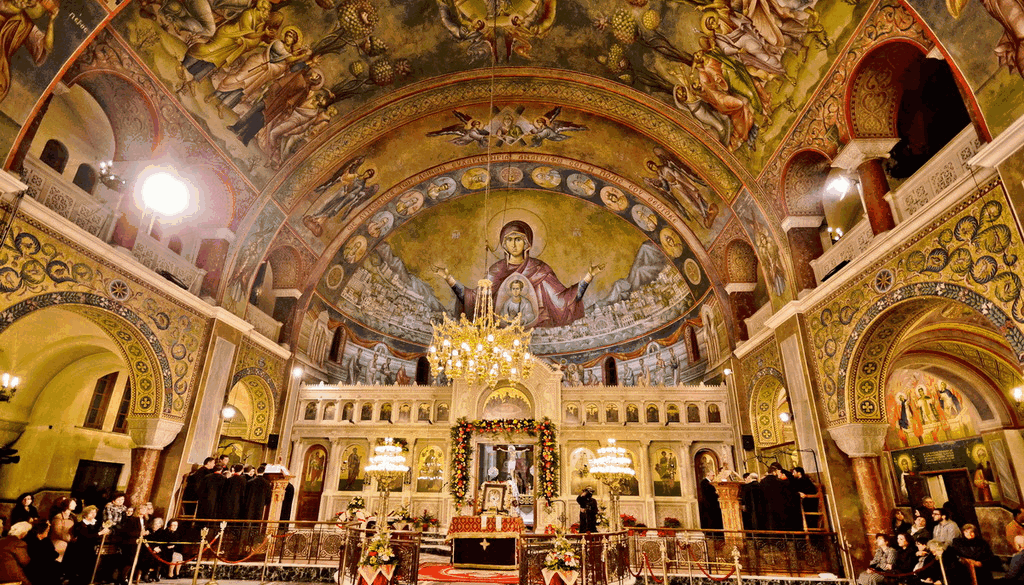 The priest, standing before the altar, says the first prayer of the faithful. This prayer refers to “conscience”, specifically, the priest who is to offer the Sacrament of the Holy Eucharist must have a clear conscience. But what is conscience?
The priest, standing before the altar, says the first prayer of the faithful. This prayer refers to “conscience”, specifically, the priest who is to offer the Sacrament of the Holy Eucharist must have a clear conscience. But what is conscience?
We can mention two persons as examples. They are involved in Christ’s Passion: Peter and Judas. Peter, the zealous disciple of Christ, boldly proclaimed that he would never betray his Lord, even if all the others did. Christ, however, told Peter: “Before the rooster crows tonight you will say three times that you don’t know me” (Mt 26,34). And so it happened. On the night of Holy Thursday, he watched the Divine Drama, hiding his own drama. His fear dominated him completely. He trembled with fear of being recognized as a disciple and arrested. Three times betrayed the Lord with curses and denials.
Certainly, his conscience existed but it was asleep. With the crow of the rooster his conscience woke up. Just then Christ was passing through the courtyard and his glimpse affected him. Aware of his sin Peter went out and wept bitterly. However, with the help of the Divine Grace he repented and God’s peace returned to his heart.
Judas was one of the Twelve but his sin was greater than Peter’s. Peter denied Christ from fear, but Judas betrayed Him from avarice. He sold his Teacher for thirty coins, the price of a slave. When he accepted the purse of the coins his conscience was diseased, darkened, distorted by avarice. Later, when he learnt that Christ was condemned, his conscience woke up. Like a stormy, troubled sea, it cast up great waves of despair, trying to drown him. Completely alone without the help of the Divine Grace, he fought the raging waves but he was overwhelmed by them. In despair, he ended his own life. He hung himself. Selfish people may kneel down and repent but avarice hardens the heart, darkens and confuses the mind.
Conscience is the faculty of the soul which distinguishes good from evil. It is a natural part of man’s soul. Adam and Eve, the first to sin, felt the remorse of conscience and tried to hide from God’s sight. Cain, the first murderer, could never calm himself. The voice: “Cain, Cain where is your brother?” would not leave him in peace. As St. Chrysostomos said, it is better to be stung by a scorpion than by the conscience. When our passions roar in our souls, the voice of conscience can’t be heard. However, when Christ will be back to judge the world, the voice of our conscience will be endless and unbearable. It will be an eternal damnation.
1a. Faithful / good people
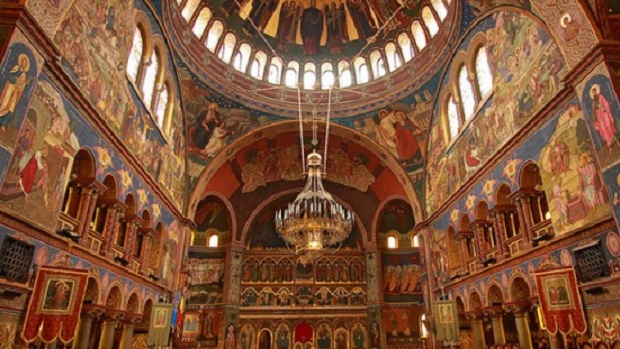 If order must prevail during the first part, the Liturgy of the Catechumens (those not yet baptized), so that everyone can hear the petitions, the prayers, readings and sermon, order must prevail much more in the second part. Now the Lord, no longer as Teacher but as Archpriest, prepares to celebrate the Sacrament of the Divine Eucharist, to offer His body and blood to the faithful. Those who really confess the “Symbol of the Faith” are the faithful. Only these can participate in this mystery of the Holy Eucharist.
If order must prevail during the first part, the Liturgy of the Catechumens (those not yet baptized), so that everyone can hear the petitions, the prayers, readings and sermon, order must prevail much more in the second part. Now the Lord, no longer as Teacher but as Archpriest, prepares to celebrate the Sacrament of the Divine Eucharist, to offer His body and blood to the faithful. Those who really confess the “Symbol of the Faith” are the faithful. Only these can participate in this mystery of the Holy Eucharist.
Are faithful the “christians” who come to church only on Christmas and Easter? If one were to ask these people: “Why don’t you come to church regularly?” The answer would be: “We don’t go to church, but we are good people.” Those who sign their own certificates of merit, are sadly mistaken.
First, they don’t know themselves. If they were to examine their own lives from childhood to this day, they would find that they have often violated God’s will as expressed in Scripture. No matter how good they may appear to be, they may be corrupt at heart. If they don’t do evil acts, this might be for fear of becoming caught in the nets of human justice.
Secondly, those who claim to be good don’t know the Bible. Because in the Gospels we read that in order to be saved, good deeds are not enough, no matter how many or how great they might be. A thousand acts of charity can’t save the unbeliever. If good acts could save a man, then it was not necessary for the Son of God to come into the world and be crucified. His sacrifice would have been in vain.
So, we are saved through faith. “Whoever believes and is baptized will be saved; whoever does not believe will be condemned” (Mk 16,16). Faith is indispensible for salvation. The same faith is indispensible for participation in the mystery of the Holy Eucharist. We gain nothing if we go to church because it is the custom, if we go without faith in Christ.
3b. "For an Angel of Peace"
"For an angel of peace, a faithful guide, a guardian of our souls and bodies, let us ask of the Lord"
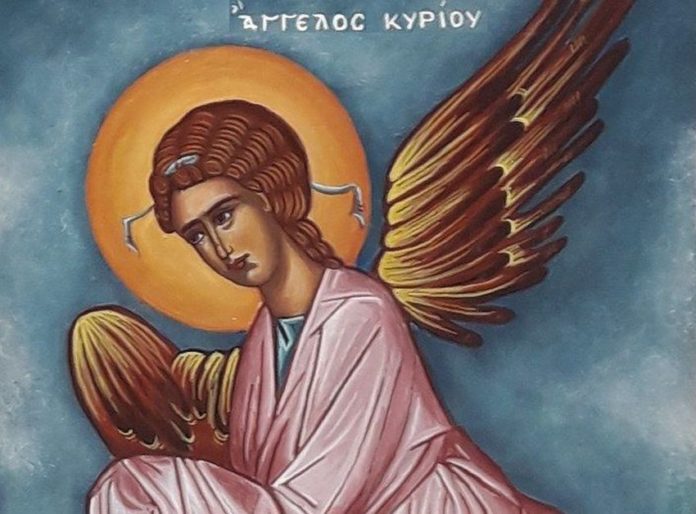 With this petition we ask God to send an angel to guard our souls and bodies. An angel? Unbelievers hearing this would ridicule Christians, who, in the twentieth century, believe in the existence of angels. An astronaut of an atheistic state once said, that when he flew in space, he did not see any angels not even a wing! What foolishness! He was expecting to see an angel.... The area in which the atheist astronaut flew was very small, indeed, the smallest part of the endless universe. And even if he were able to fly through the entire universe in his rocket, he would not find an angel's wing. This is because an angel is not a material creature, to be seen by mortal eyes.
With this petition we ask God to send an angel to guard our souls and bodies. An angel? Unbelievers hearing this would ridicule Christians, who, in the twentieth century, believe in the existence of angels. An astronaut of an atheistic state once said, that when he flew in space, he did not see any angels not even a wing! What foolishness! He was expecting to see an angel.... The area in which the atheist astronaut flew was very small, indeed, the smallest part of the endless universe. And even if he were able to fly through the entire universe in his rocket, he would not find an angel's wing. This is because an angel is not a material creature, to be seen by mortal eyes.
As to whether angels exist or not depends on an answer to a more basic question: Does God exist? Yes or no? If God does not exist, then neither do angels. The one who denies the existence of God, the Supreme Spirit, naturally denies the existence of lower spirits, the angels. Such a person accepts only material things and nothing else.
Human thought is immaterial, something spiritual, which we cannot grasp or weigh on a scale. Where does it come from? From matter? A handful of dirt, a piece of metal does not have mind. Matter does not possess reason.
The materialist, who does not accept the creed "I believe in one God, the Father almighty...", is forced to believe in another dogma which presents much greater difficulties than those of the Christian doctrine. The unbeliever says: "I believe in omnipotent matter..." How illogical is the Creed of materialists!
The highest of all creatures is man. Man is composite. He is body and soul. As a body, he belongs to the material world; as a soul, he belongs to the unseen spiritual world. As certain as we are that man is a body, so sure we are that he is soul. Man is a compound of matter and spirit.
The question is raised: Could not God, Who created man as a link between the visible and invisible worlds also create beings having no body, but only spirit? He certainly could, and He did create such beings. These are the angels.
The existence of angels, which reason does not reject, is confirmed in the word of God, the Holy Scripture. Anyone who reads the Bible can see that angels and archangels are mentioned there many times. We will mention two Scriptural passages: "When the stars were made, all my angels praised me with a loud voice" (Job 38:7). In this passage, not only the existence of angels is affirmed but also the time of their creation. The angels and archangels existed before the heavens and the stars were made. Such a spectacle the heavens and shining stars presented, that the angels and archangels, seeing such a marvelous thing rise out of chaos, could not stand indifferent and apathetic, but were filled with admiration, and began praising and glorifying the omnipotent and all-wise God. Truly, one of the most convincing proofs of God's existence and His grandeur is the sight of the heavens at night.
The material world has stars, but the spiritual world has its stars as well. In the spiritual world, the angels shine like stars; and above the spiritual lights of the angels is the eternal and inaccessible light of the triune Deity, the Holy Trinity: Father, Son and Holy Spirit.
Another biblical passage which affirms the existence of the angelic world was spoken by our Lord Jesus Christ Himself. He who created both material and spiritual worlds and who knows with all detail all the beings, Christ Himself said that everyone, even a person the world considers small and unimportant, is protected by the Father. The same angels who, by the command of our heavenly Father guard and protect the lowliest people of the earth, also surround God's throne and pray for those to whom they are assigned as guardians. "See that you do not despise any of these little ones. Their angels in heaven, I tell you, are always in the presence of my Father in heaven" (Mt. 18:10).
What a comfort there is in the fact that we have someone next to us ready to protect and guard us! In order to keep this angel by our side as our guardian and protector, we have to be careful not to sin. It is because of this that the angel leaves us and laments. Yes! We sin and laugh, while angels cry and lament in heaven because we have fallen. Lord, have mercy on us!
3a. New Petitions
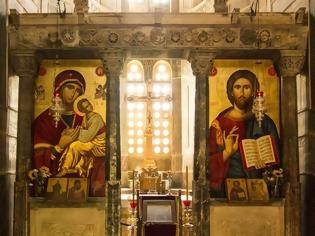 After the Great Entrance the priest goes into the holy Sanctuary and he sends up to God a new series of petitions. These are ten petitions and they prepare the faithful spiritually to offer the Mystery of the holy Eucharist.
After the Great Entrance the priest goes into the holy Sanctuary and he sends up to God a new series of petitions. These are ten petitions and they prepare the faithful spiritually to offer the Mystery of the holy Eucharist.
Let us examine the first two of these petitions.
1. “For the precious Gifts, here presented, let us pray to the Lord”.
If the Gifts are precious, why do we need this petition? Yes, they are precious. They have been pure since the Service of Preparation. But now they are on the holy Table and the great Mystery is about to take place. The bread will become Christ's Body and the wine will become Christ's Blood; and the priest calls everyone who is going to receive Communion, to pray.
Also, at this time when the precious Gifts are placed on the Table, we are being told to remember that our hearts must be clean of every evil and vengeful stain, as the Lord has said: "So, if you are about to offer your gift to God at the altar and there you remember that your brother has something against you, leave your gift there..." (Mt 5:23-24). That is to say, unless you forgive your enemies, you should not offer gifts. Look at your gifts on the holy Table: Your hearts must be pure!
2. The next petition is "For this whole day, that it may be perfect, holy, peaceful and sinless..."
God appointed the day for man's work. As David says in the Vesper Psalm: "The sun ariseth, and they are gathered together, and they lay them down in their dens. But man shall go forth unto his work, and to his labour until the evening' (Ps (104:22-23)103:22-23). Day is the time to work, and you can see everybody, except for the sick, the old and the lazy, leaving for work in the morning. But during the day, they meet with problems, snags and temptations stemming from many sources. We are not living in a society of angels and archangels; we are living in a society of men having faults and vices. All of us are encircled by temptations from within and around. As St. Anthony the Great once saw in a vision, the entire earth is filled with traps, and wherever we go or wherever we are, if we are not careful, we are in danger of falling into sin. Traps in the cities, traps in the towns, traps in the streets and squares, and even traps in deserts and monasteries, where you may think there are no temptations!
What do we need to save ourselves from life's many temptations? First of all, we need attention. Let us pay attention to our thoughts, because every sin and crime starts there. If we stay alert and drive evil thoughts out of our minds, we will have the first victory over temptation. Because temptation comes on us very strongly and we are spiritually weak, we need God's help. Whoever thinks he has a strong character and is invincible, he is in a position to commit even more horrible crimes. There are terrible times in our lives that can destroy all spiritual life, and only the divine grace can save those who ask for it in humility. Therefore, let us pray at the beginning of every day that it may be "perfect, holy, peaceful and sinless."
Λειτουργικό κήρυγμα (Κυριακή ἀσώτου)
Ἡ ἱστορία τοῦ ἀνθρώπου σέ τέσσερις φάσεις
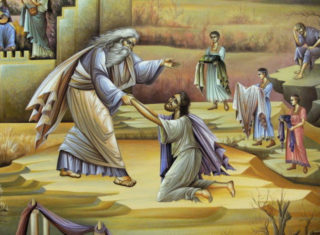 Ἡ παραβολή τοῦ ἀσώτου (Λκ 15,11-32) χαρακτηρίσθηκε ὡς τό εὐαγγέλιο τῶν εὐαγγελίων, ὡς τό μαργαριτάρι ὅλων τῶν παραβολῶν. Σ' αὐτή τή σύντομη παραβολή παρουσιάζεται μέ ἀκρίβεια ἡ ἱστορία τοῦ ἀνθρώπου -θά ἔλεγα ἡ παγκόσμια ἱστορία- σέ τέσσερις σταθμούς: ἀποστασία - καταστροφή, ἐπιστροφή - σωτηρία. Αὐτό εἶναι καί τό περιεχόμενο ὅλης τῆς ἁγίας Γραφῆς.
Ἡ παραβολή τοῦ ἀσώτου (Λκ 15,11-32) χαρακτηρίσθηκε ὡς τό εὐαγγέλιο τῶν εὐαγγελίων, ὡς τό μαργαριτάρι ὅλων τῶν παραβολῶν. Σ' αὐτή τή σύντομη παραβολή παρουσιάζεται μέ ἀκρίβεια ἡ ἱστορία τοῦ ἀνθρώπου -θά ἔλεγα ἡ παγκόσμια ἱστορία- σέ τέσσερις σταθμούς: ἀποστασία - καταστροφή, ἐπιστροφή - σωτηρία. Αὐτό εἶναι καί τό περιεχόμενο ὅλης τῆς ἁγίας Γραφῆς.
Ὁ ἄνθρωπος πλάσθηκε ἀπό τόν Θεό καί τοποθετήθηκε στόν παράδεισο. Ἀποσκίρτησε ὅμως, ἔγινε ἀντάρτης καί ἀναρχικός. Καί αὐτή ἡ ἀνταρσία του τόν ἀπομάκρυνε ἀπό τόν Θεό. Καί τά ἀποτελέσματα; Ὅσα γράφουν ὅλοι οἱ ἱστορικοί καί τά γνωρίζουμε κι ἐμεῖς ἀπό τήν πραγματικότητα: ἡ καταστροφή, ἡ τραγωδία, οἱ πόλεμοι, ἡ ἀναρχία, ἡ ἀδικία, ἡ διαφθορά, ἡ ἀνηθικότητα, οἱ αὐτοκτονίες, κ.ἄ. Καί ἡ λύση τοῦ δράματος; Μία: ἡ ἐπιστροφή, ἡ μετάνοια. Μέ τή μετάνοια ὅλα ἀποκαθίστανται, ὅλα γίνονται παράδεισος· ὁ ἄνθρωπος πλέον υἱοθετεῖται καί γίνεται παιδί τοῦ Θεοῦ καί εἶναι ὑποψήφιος τῆς αἰώνιας βασιλείας.
Ἀναφέρω ἀπό τήν ἴδια τήν παραβολή ὁρισμένα σημεῖα. Ὁ ἄσωτος ζεῖ μέσα στήν ἀθλιότητα. Κατήντησε χοιροβοσκός. Κι ἐνῶ τά γουρούνια πού βόσκει χορταίνουν ξυλοκέρατα, αὐτός δέν μπορεῖ νά γεμίσει τήν κοιλιά του. Ἡ συνειδητοποίηση τῆς κατάστασής του δημιουργεῖ ἕναν τρανταγμό μέσα του, μιά ἀναστάτωση, ἡ ὁποία τόν φέρνει στά συγκαλά του. «Εἰς ἑαυτὸν δὲ ἐλθών», σημειώνει ὁ Λουκᾶς. Αὐτό σημαίνει ὅτι πρίν ἦταν ἐκτός ἑαυτοῦ, ἦταν τρελός. Ὄντως ἡ ἀποστασία ἀπό τόν Θεό, ἡ καταπάτηση τοῦ θείου θελήματος εἶναι τρέλα, ὅπως εἶναι τρέλα νά ἐγκαταλείψει μέ τή θέλησή του ἕνας ὁδηγός τό κατάστρωμα τοῦ δρόμου καί νά ρίξει τό αὐτοκίνητό του στόν γκρεμό. Ἦταν τρελός, λοιπόν, καί ὅταν ἦλθε στά συγκαλά του, ἀποφασίζει νά ἐπιστρέψει στόν πατέρα του, νά πέσει στά πόδια του μέ μετάνοια, μέ συντριβή καί νά πεῖ: «πάτερ, ἥμαρτον εἰς τὸν οὐρανὸν καὶ ἐνώπιόν σου καὶ οὐκέτι εἰμὶ ἄξιος κληθῆναι υἱός σου· ποίησόν με ὡς ἕνα τῶν μισθίων σου».
Καί ὁ σπλαγχνικός πατέρας εἶδε ἀπό μακριά τό παιδί καί, παρόλο πού ἦταν σέ ἐλεεινή κατάσταση, τό ἀναγνώρισε. Τό περίμενε, τό ζητοῦσε μέ ἀγωνία. Μέ ἀμείωτη στοργή καί πατρική ἀγάπη τό ἀγκάλιασε καί τό φιλοῦσε. Καί ὄχι ἁπλῶς τό φιλοῦσε, ἀλλά τό καταφιλοῦσε.
Τί μεγάλο πράγμα ἡ μετάνοια! Εἶναι τό θαῦμα τῶν θαυμάτων! Ἡ μετάνοια εἶναι ἐκείνη πού κάνει τόν Θεό νά ἀγκαλιάζει τόν πιό μεγάλο ἁμαρτωλό. Τί λέγω; Ἡ μετάνοια κάνει τόν Θεό νά μετανοεῖ. Αὐτό ὅταν τό πρωτοδιάβασα στήν ἁγία Γραφή συγκλονίστηκα. Τί δύναμη ἔχει αὐτή ἡ μετάνοια! Τό σχέδιο τοῦ Θεοῦ εἶναι ὅτι πρέπει ἡ ἀποστασία νά τιμωρηθεῖ· «πᾶσα παράβασις καὶ παρακοὴ ἔ- λαβεν ἔνδικον μισθαποδοσίαν» (Ἑβ 2,2). Κι ὅμως, ἐνῶ αὐτή εἶναι ἡ ἀπόφαση, φαίνεται νά μετανοεῖ ὁ Θεός. Δέχεται τόν ἁμαρτωλό, τόν ἀγκαλιάζει καί τόν συγχωρεῖ. Ἀντί νά μᾶς καταστρέψει, μᾶς ἁγιάζει καί μᾶς δοξάζει. Ὤ δύναμη πού ἔχει ἡ μετάνοια!
Καί μάλιστα, ὅπως τό τονίζει κατ᾽ ἐπανάληψη ἡ ἁγία Γραφή, ὁ Θεός ὁ παντογνώστης, ὁ πάνσοφος δέν θυμᾶται -κρατῆστε το καλά αὐτό- δέν θυμᾶται τίς ἀνομίες μας, τίς ἀδικίες μας, τίς ἁμαρτίες μας! Πότε; Ὅταν μετανοήσουμε καί μέ δάκρυα, συντριβή καί Ἐξομολόγηση ζητήσουμε τό ἔλεός του. Τότε μέ τό αἷμα του ξεπλένει καί ἐξαφανίζει τίς ἁμαρτίες. Τό βεβαιώνει· «καὶ τῶν ἁμαρτιῶν αὐτῶν καὶ τῶν ἀνομιῶν αὐτῶν οὐ μὴ μνησθῶ ἔτι» (Ἰζ 38,34· Ἑβ 8,12). Καί τό βλέπουμε καί στήν παραβολή.
Δίδει ὁ πατέρας ἐντολή στούς δούλους του νά ντύσουν μέ τή στολή τήν πρώτη, τήν ὡραία τόν γιό του πού ἐπέστρεψε, πού ἦταν νεκρός καί ἀναστήθηκε, χαμένος καί βρέθηκε. Νά τόν ντύσουν γιά νά μή φαίνονται οἱ κακίες καί οἱ ἁμαρτίες, νά φαίνεται βασιλόπουλο. Ἀκόμη νά τοῦ δώσουν δαχτυλίδι στό χέρι πού σημαίνει ὅτι τοῦ δίδει ἐξουσία, τήν ἐξουσία τῆς υἱοθεσίας, ὅτι εἶναι παιδί του. Δέν ὑπάρχει μεγαλύτερη ἐξουσία ἀπό τό νά εἶναι κανείς παιδί τοῦ Θεοῦ, κληρονόμος τῆς περιουσίας καί τῆς δόξης τοῦ Θεοῦ, συγκοινωνός καί συμμέτοχος μέ τόν Θεό στήν αἰώνια βασιλεία· «ὅσοι δὲ ἔλαβον αὐτόν, ἔδωκεν αὐτοῖς ἐξουσίαν τέκνα Θεοῦ γενέσθαι, τοῖς πιστεύουσιν εἰς τὸ ὄνομα αὐτοῦ» (Ἰω 1,12). Καί αὐτή τήν ἐξουσία τή δίδει στό παιδί του πού ἀποστάτησε, πού καταπάτησε τό θέλημά του, πού ἔκανε ὅ,τι ἔκανε, πού κατήντησε ἐκεῖ πού κατήντησε. Γιατί; Διότι μετανόησε.
Καί τό καταπληκτικό: δίδει ἐντολή νά σφάξουν «τὸν μόσχον τὸν σιτευτόν», τό μοσχάρι πού ἰδιαίτερα τό τάιζαν γιά μεγάλη πανήγυρη. Οἱ πατέρες καί οἱ διδάσκαλοι ἑρμηνεύουν ὅτι «ὁ μόσχος ὁ σιτευτός» εἶναι ὁ ἀμνός τοῦ Θεοῦ, ὁ ὁποῖος θυσιάζεται, γιά νά μᾶς ξεπλύνει ἀπό τίς ἁμαρτίες, νά μᾶς θρέψει μέ τό σῶμα του καί τό αἷμα του ὥστε νά ἔχουμε ζωή αἰώνια.
Τήν παραβολή αὐτή τοῦ ἀσώτου τή χαρακτηρίζουν οἱ πατέρες καί παραβολή τοῦ σπλαγχνικοῦ πατέρα. Ὁ σπλαγχνικός πατέρας, ὁ πολυέλεος, ὁ μακρόθυμος εἶναι ὁ Κύριος καί Θεός μας, ὁ ὁποῖος δέχεται τόν ἄσωτο, ὅταν μετανοήσει, ξεχνάει ὅλα τά κακά καί τόν ἔχει στήν Ἐκκλησία του μέλος ζωντανό καί ὑποψήφιο γιά τήν αἰώνια βασιλεία του.
Ἀδελφοί μου, συνοψίζω ὅσα εἶπα ἐπαναλαμβάνοντας τά τέσσερα κύρια σημεῖα πού ἔχει ἡ παραβολή τοῦ ἀσώτου: ἡ ἀποστασία ὁδηγεῖ στήν καταστροφή, ἡ ἐπιστροφή ὁδηγεῖ στή σωτηρία. Ὅλοι ἔχουμε ἀνάγκη ἀπό μετάνοια καί ἀπό τήν ἀγάπη τοῦ σπλαγχνικοῦ πατέρα πού μᾶς σώζει.
Στ. Ν. Σάκκος
Κυ 31-1-2010, Φίλυρο
Μόνο καταστροφή
 Δέν πρόλαβε νά κλείσει τό ἐπετειακό ἔτος ἀπό τά 200 χρόνια τῆς Ἑλληνικῆς Ἐπανάστασης καί στόν ΣΚΑΙ, ὕστερα ἀπό δέκα χρόνια, «ἔσκασε» νέα ἐθνοαποδομητική βόμβα. Πρόκειται γιά μιά σειρά ντοκιμαντέρ πού προβλήθηκε τόν Ἰανουάριο, μέ γενικό τίτλο «Καταστροφές καί Θρίαμβοι». Ἕνα ὁδοιπορικό μέσα ἀπό ἑφτά ἱστορικούς κύκλους τῆς ἱστορίας μας, ἀπό τό ξέσπασμα τῆς Ἑλληνικῆς Ἐπανάστασης μέχρι τήν πρόσφατη οἰκονομική κρίση, ὅλες μέ κοινά χαρακτηριστικά ὅπως: μεγαλόπνοα σχέδια, μεγάλες καταστροφές ἀλλά καί ἐντυπωσιακούς θριάμβους. Τό ἀφήγημα τῆς σειρᾶς εἶναι θετικό καί αἰσιόδοξο. Κάθε ἐπεισόδιο κλείνει μέ τήν μεγάλη ἀνατροπή, δείχνοντας πώς τελικά μέσα ἀπό κάθε καταστροφή ξεπηδᾶ ἕνας θρίαμβος καί ἡ χώρα συνεχίζει νά προοδεύει. Τό κεντρικό ἐρώτημα εἶναι: Πῶς τελικά καταφέρνουμε νά μετουσιώνουμε τίς καταστροφές σέ θριάμβους; Ἕνα ἐρώτημα πού δέν εἶναι τόσο ἱστορικό, ὅσο πολιτικό, καθώς ὑποχρεώνει τήν ἔρευνα νά προσαρμοστεῖ ἐπιτακτικά στήν ἐξήγηση τῆς «καταστροφῆς» ἤ τοῦ «θριάμβου», παγιώνοντας μιά ἀντίληψη ἱστορικοῦ πεπρωμένου γιά τή χώρα ἡ ὁποία βασίζεται σέ πολύ συγκεκριμένα πολιτικά κριτήρια, ἀφήνοντας στό σκοτάδι κεντρικές ὄψεις τῆς ὑπό ἐξέταση ἐποχῆς.
Δέν πρόλαβε νά κλείσει τό ἐπετειακό ἔτος ἀπό τά 200 χρόνια τῆς Ἑλληνικῆς Ἐπανάστασης καί στόν ΣΚΑΙ, ὕστερα ἀπό δέκα χρόνια, «ἔσκασε» νέα ἐθνοαποδομητική βόμβα. Πρόκειται γιά μιά σειρά ντοκιμαντέρ πού προβλήθηκε τόν Ἰανουάριο, μέ γενικό τίτλο «Καταστροφές καί Θρίαμβοι». Ἕνα ὁδοιπορικό μέσα ἀπό ἑφτά ἱστορικούς κύκλους τῆς ἱστορίας μας, ἀπό τό ξέσπασμα τῆς Ἑλληνικῆς Ἐπανάστασης μέχρι τήν πρόσφατη οἰκονομική κρίση, ὅλες μέ κοινά χαρακτηριστικά ὅπως: μεγαλόπνοα σχέδια, μεγάλες καταστροφές ἀλλά καί ἐντυπωσιακούς θριάμβους. Τό ἀφήγημα τῆς σειρᾶς εἶναι θετικό καί αἰσιόδοξο. Κάθε ἐπεισόδιο κλείνει μέ τήν μεγάλη ἀνατροπή, δείχνοντας πώς τελικά μέσα ἀπό κάθε καταστροφή ξεπηδᾶ ἕνας θρίαμβος καί ἡ χώρα συνεχίζει νά προοδεύει. Τό κεντρικό ἐρώτημα εἶναι: Πῶς τελικά καταφέρνουμε νά μετουσιώνουμε τίς καταστροφές σέ θριάμβους; Ἕνα ἐρώτημα πού δέν εἶναι τόσο ἱστορικό, ὅσο πολιτικό, καθώς ὑποχρεώνει τήν ἔρευνα νά προσαρμοστεῖ ἐπιτακτικά στήν ἐξήγηση τῆς «καταστροφῆς» ἤ τοῦ «θριάμβου», παγιώνοντας μιά ἀντίληψη ἱστορικοῦ πεπρωμένου γιά τή χώρα ἡ ὁποία βασίζεται σέ πολύ συγκεκριμένα πολιτικά κριτήρια, ἀφήνοντας στό σκοτάδι κεντρικές ὄψεις τῆς ὑπό ἐξέταση ἐποχῆς.
Ἤδη ἀπό τόν τίτλο τοῦ πρώτου ἐπεισοδίου, «Μιά χώρα γεννιέται», ἀναδύονται ἀνιστόρητα ἀναθεωρητικές ἀναθυμιάσεις προκαλώντας δυσφορία σέ κάθε ἀνύποπτο Ἕλληνα, ἁπλῶς ἀπόφοιτο Γυμνασίου, πού θά θελήσει μέ φιλομάθεια νά παρακολουθήσει αὐτήν τήν κατά τά ἄλλα ἐντυπωσιακή σειρά. «Ἦταν ἕτοιμος ὁ Ἑλληνισμός γιά τήν ἐπανάσταση. Ἀλλά ποιός Ἑλληνισμός; Δέν εἶναι οἱ φτωχοί ἀγρότες καί οἱ κτηνοτρόφοι. Εἶναι οἱ ἔμποροι καί οἱ διανοούμενοι, γιατί ἔχουν ἀντιληφθεῖ ὅτι τό brand name "Ἕλληνας" εἶναι κάτι πολύ σημαντικό στήν Εὐρώπη», θά δηλώσει μέ στόμφο ἕνας ἀπό τούς ἔγκριτους ἱστορικούς πού συμμετεῖχε στή συζήτηση. Οἱ ἔμποροι καί οἱ διανοούμενοι, λοιπόν, πού εἶχαν τό προνόμιο καί τή δυνατότητα ἐπιλογῆς νά ζοῦν σέ συνθῆκες ἐλευθερίας καί ἀξιοπρέπειας στήν Ἑσπερία, συνέλαβαν τήν ἰδέα τῆς δημιουργίας μιᾶς χώρας, τύπου startup, μέ ἕνα ἰδιαίτερα «πιασιάρικο» brand name γιά ἐκείνη τήν ἐποχή! Πῶς ἐξηγοῦν ὅμως τό γεγονός, ἀκόμα καί ἀγράμματοι ἀγρότες καί κτηνοτρόφοι νά ἐπιμένουν νά δίνουν στά παιδιά τους ἀρχαιοελληνικά ὀνόματα;
«Ἡ ἰδέα τῆς δημιουργίας ἑνός ἀνεξάρτητου ἑλληνικοῦ κράτους τήν ἐποχή ἐκείνη ἦταν ὄχι ἁπλά πρωτότυπη, ἀλλά ρηξικέλευθη», θά δηλώσει ἄλλος θριαμβευτικά (θά ἔλεγα εγώ, μᾶλλον καταστρο-φικά). Δέν θέλω νά πιστεύω ὅτι δέν διάβασαν ποτέ στά Ἀπομνημονεύματα τοῦ Κολοκοτρώνη (ἐκτός ἄν δέν τόν συνάντησαν πουθενά στήν ἱστορία πού προσπαθοῦν νά μᾶς διδάξουν) τήν ἀπάντηση πού ἔδωσε στόν Χάμιλτον, ὅταν τόν συμβούλεψε ὅτι πρέπει οἱ Ἕλληνες νά ζητήσουν συμβιβασμό μέ τήν Τουρκία μέ τή μεσολάβηση τῆς Ἀγγλίας. «Ἐμεῖς, καπετάν Ἄμιλτον, ποτέ συμβιβασμόν δέν ἐκάναμεν μέ τούς Τούρκους. Ἄλλους ἔκοψε, ἄλλους ἐσκλάβωσε μέ τό σπαθί, καί ἄλλοι καθώς ἐμεῖς ἐζήσαμεν ἐλεύθεροι ἀπό γενεά εἰς γενεά. Ὁ βασιλεύς μας ἐσκοτώθη, καμιά συνθήκη δέν ἔκαμε. Ἡ φρουρά του εἶχε παντοτεινόν πόλεμον μέ τούς Τούρκους καί δύο φρούρια ἦταν ἀνυπόταχτα. Μέ εἶπε: Ποιά εἶναι ἡ βασιλική φρουρά του, ποιά εἶναι τά φρούρια; Ἡ φρουρά τοῦ βασιλέως μας εἶναι οἱ λεγόμενοι κλέφτες, τά φρούρια, ἡ Μάνη καί τό Σούλι καί τά βουνά». Γιά ποιούς ἄραγε νά μιλάει αὐτός ὁ μή ἔμπορος, καί φεῦ, μή διανοούμενος, οἱ ὁποῖοι ζοῦν ἐλεύθεροι ἀπό γενιά σέ γενιά, μέ βασιλιά πού σκοτώθηκε, μέ φρουρά καί φρούρια πού ἀντιστέκονται ἀκόμα, καί σέ ποιὀ βασίλειο;
Ἀλήθεια, ὁ καθηγητής Πολιτικῆς Ἐπιστήμης Στάθης Καλύβας, πού σκηνοθέτησε αὐτή τή σειρά «Καταστροφές καί Θρίαμβοι», βασιζόμενη στό ὁμώνυμο βιβλίο του, καί οἱ 35 κορυφαῖοι εἰδικοί μέ τούς ὁποίους διαλέγεται, ὅταν παρουσιάζουν τήν πρόσφατη ἱστορική ἔρευνα γιά τήν Ἑλληνική Ἐπανάσταση ἐννοοῦν τή δική μας Ἐπανάσταση τοῦ 1821; Αὐτήν πού ἔγινε στά δικά μας χώματα, πού τά κατοικοῦμε καί τά δοξάζουμε ἐδῶ καί τρεῖς χιλιάδες χρόνια; Τότε πού οἱ τουρκικές θηριωδίες, ἡ ἑλληνική αὐτοθυσία, καί ὁ χωρίς ἐπιστροφή ἀγώνας τῶν Ἑλλήνων γιά τήν ἐλευθερία, εἶχαν συνταράξει τίς συνειδήσεις σέ ὁλόκληρο τόν δυτικό κόσμο καί κατέστησαν σαφές ὅτι ἐπρόκειτο γιά τή μάχη ἑνός μικροῦ, πανάρχαιου ἔθνους για τήν ἀπελευθέρωσή του ἀπό τήν ὀθωμανική βαρβαρότητα;
Στό ἐρώτημα πού ἔγινε στόν συγγραφέα-σκηνοθέτη ποιά εἶναι ἡ κύρια αἰτία στήν ὁποία ἀποδίδει αὐτές τίς συχνές καταστροφές ἀλλά καί τό πετυχημένο γύρισμα σέ θρίαμβο κάθε φορά, εἶπε: «Σέ σχέση μέ τό μέγεθος τῆς χώρας μας ἔχουμε ἀσυνήθιστη φιλοδοξία, γι’ αὐτό καί οἱ καταστροφές πού περνᾶμε τραβοῦν πάνω μας τήν παγκόσμια προσοχή». Ἐμεῖς, δηλαδή, σάν λαός μέ τίς ἐπιλογές μας συνεχῶς ὁδηγούμαστε σέ καταστροφές καί ἐκείνο πού διασφαλίζει στό σχῆμα «καταστροφές - θρίαμβοι» τή συνέχεια τῶν επιτευγμάτων, καθιστώντας τίς καταστροφές πρόσκαι-ρες, εἶναι ἡ ἐπέμβαση τῶν ξένων! Ὁδηγούμαστε δηλαδή στόν θρίαμβο ἀπό ἐξωγενείς παράγοντες, σχεδόν ἀπό σπόντα!
Χαρακτηριστικό ἱιστορικό παράδειγμα γιά αὐτό ἀναφέρουν τήν πολυσυζητημένη ναυμαχία τοῦ Ναυαρίνου, στήν ὁποία οἱ συνασπισμένες ναυτικές δυνάμεις Ἀγγλίας, Γαλλίας καί Ρωσίας κατέστρεψαν τόν τουρκοαιγυπτιακό στόλο καί «ἀναχαίτισαν ὁριστικά τήν καταστροφική ὁρμή τοῦ ἀήττητου Ἰμπραήμ, πού εἶχε καταλάβει τήν Πελοπόννησο καί εἶχε καταστείλει τήν Ἐπανάσταση, ἀφήνοντας πίσω του ἀποκαΐδια». Ποιόν Ἰμπραήμ ἐννοοῦν καί ποιά Πελοπόννησο; Ἐκεῖνον πού ἀπέτυχε νά ἀναγκάσει τούς ἐξαθλιωμένους Ἕλληνες νά προσκυνήσουν καί παγιδεύτηκε σέ στρατηγικό ἀδιέξοδο στήν δυσανάλογα μικρή γιά τόν ὄγκο τοῦ στρατεύματός του Πελοπόννησο; Ἤ μήπως θεωροῦν ὅτι τό ἀπόρθητο Ναύπλιο καί ἡ Μάνη, στήν ὁποία ἐπανειλημμένα νικήθηκε, δέν ἀνήκουν στήν Πελοπόννησο;
«Καταστροφή», λοιπόν, χαρακτηρίζουν τήν ἥττα τῶν Ἕλλήνων στό στρατιωτικό ἐπίπεδο, χωρίς νά ἀναφερθοῦν στήν τιτάνεια ἀντίσταση ἐκείνων τῶν ἀγράμματων καί φτωχῶν γιά ἐννέα ὁλόκληρα χρόνια, καί «θρίαμβο» τή διάσωση τῆς Ἐπανάστασης ἀπό τίς ξένες δυνάμεις καί τή δημιουργία τοῦ ἀνεξάρτητου Ἑλληνικοῦ κράτους πού μᾶς τήν χάρισαν ἀπό ἐντελῶς ἁγνά καί φιλελληνικά αἰσθήματα! Τήν ὁρμή τοῦ Αἰγύπτιου Μοχάμετ Ἄλη ἤθελαν νά ἀναχαιτίσουν, ὁ ὁποῖος πίσω ἀπό τήν Πελοπόννησο ἔβλεπε τήν κατάκτηση τῆς Κωνσταντινούπολης, κι αὐτό βόλεψε νά γίνει σέ ἑλληνικά ἐδάφη τή συγκεκριμένη χρονική στιγμή.
Δέν διαθέτω τήν κατάλληλη ἐπιστημονική κατάρτιση γιά νά τολμήσω νά ἀναθεωρήσω ὅλα τά ἀνιστόρητα πού μοῦ προκάλεσαν ἀσφυξία. Αὐτό ἄς τό ἀναλάβουν οἱ Ἕλληνες ἱστορικοί. Μέχρι νά «σκάσει» ἡ ἑπόμενη βόμβα ἔχουν διάστημα δέκα ἐτῶν. Ἐγώ, διαπιστώνοντας τό μέγεθος τῆς ἀποδόμησης πού θά προκαλέσει αὐτή ἡ πολύκροτη σειρά, θά τήν ὀνόμαζα «Θρίαμβος καί καταστροφή». Μπορεῖ οἱ τριανταπέντε ἐπιστήμονες νά θριαμβολογοῦν γιά τόν ἐθνοαποδομητικό μηχανισμό πού κατάφεραν νά στήσουν, ὅμως τό ἀποτύπωμα πού ἄφησαν στή σκέψη τῶν νέων παιδιῶν εἶναι καταστροφικό. Σέ ἕναν διάλογο πού πραγματοποίησε στή συνέχεια ὁ κ. Καλύβας μέ ἐπιλεγμένους μαθητές Λυκείου γιά τό τί προσέλαβαν ἀπό τά συγκεκριμένα ντοκιμαντέρ εἶπαν: «Σ’ αὐτό πού πρέπει νά δώσουμε περισσότερο προσοχή εἶναι ὅτι πρέπει νά δοκιμάσουμε διαφορετικά πράγματα. Νά ξεχάσουμε τό παρωχημένο καί τετριμμένο. Νά μήν ἀντιμετωπίζουμε τήν ἱστορία μέ τόσο ἡρωισμό. Εἶναι τό παρελθόν μας καί πρέπει νά τό σεβόμαστε, ἀλλά πρέπει νά κατεβάσουμε ἀπό τό βάθρο τἡν ἡρωισμό τοῦ παρελθόντος»!
Ὑπάρχει μεγαλύτερη καταστροφή γιά ἕνα ἔθνος ὅταν ἀνδρώνει τέτοιους γενίτσαρους;
Δια-κριτικός
«Συντροφιά μέ τούς Νεομάρτυρες»
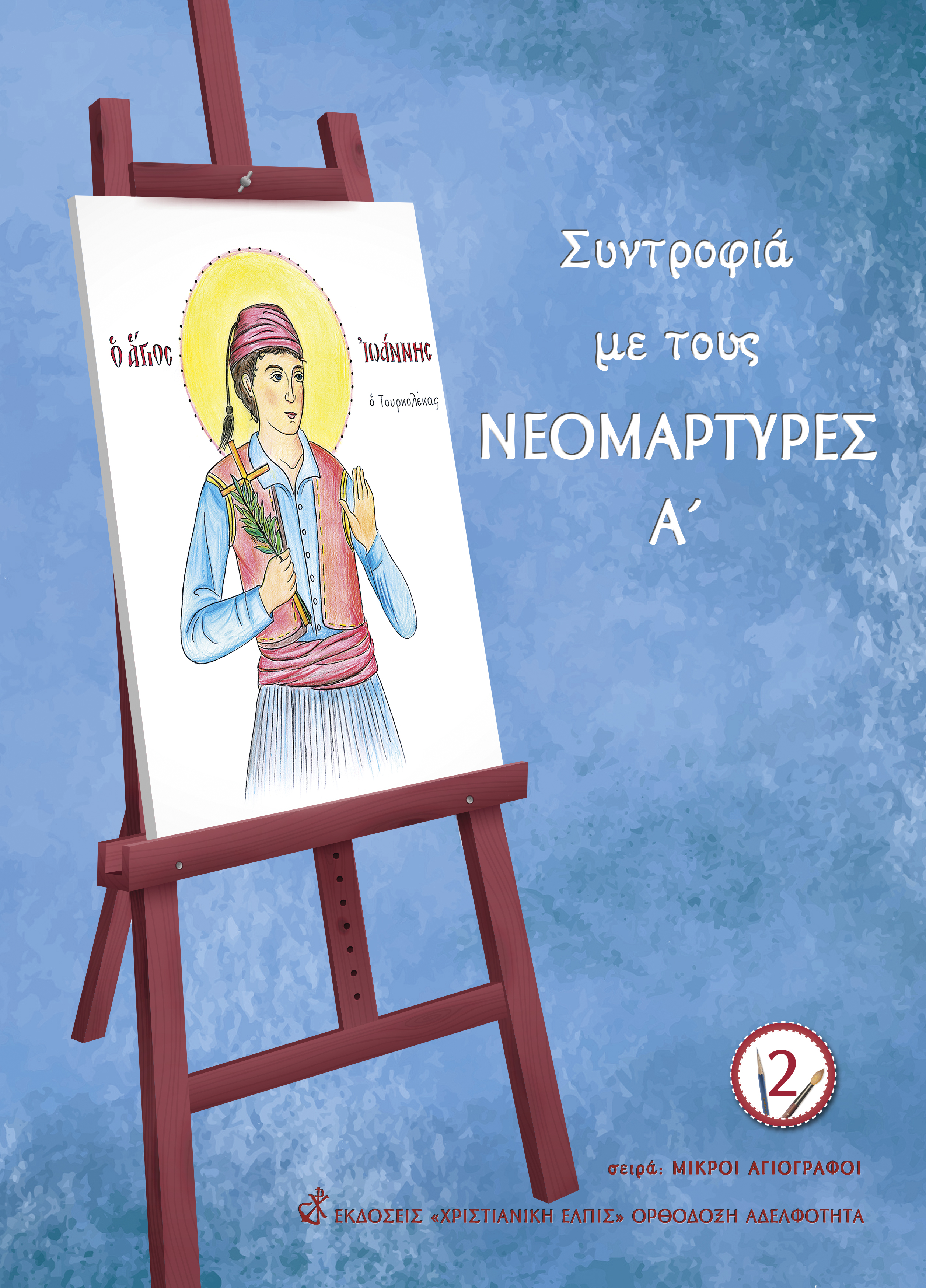
Ἀξίζει τά σύγχρονα Ἑλληνόπουλα νά μαθητεύσουν στίς σεμνές μορφές τῶν Νεομαρτύρων,
νά γνωρίσουν τή ζωή τους καί νά τούς ἁγιογραφήσουν.
ΖΗΤΗΣΤΕ ΤΟ ΣΤΟ ΒΙΒΛΙΟΠΩΛΕΙΟ "ΑΠΟΛΥΤΡΩΣΙΣ", Γ. Μπακατσέλου 5, Θεσ/νίκη, τηλ. 2310 274518
καί στό ἠλεκτρονικό μας βιβλιοπωλεῖο https://www.apolytrosis-books.gr
«Συμφέρουσα συναλλαγή»
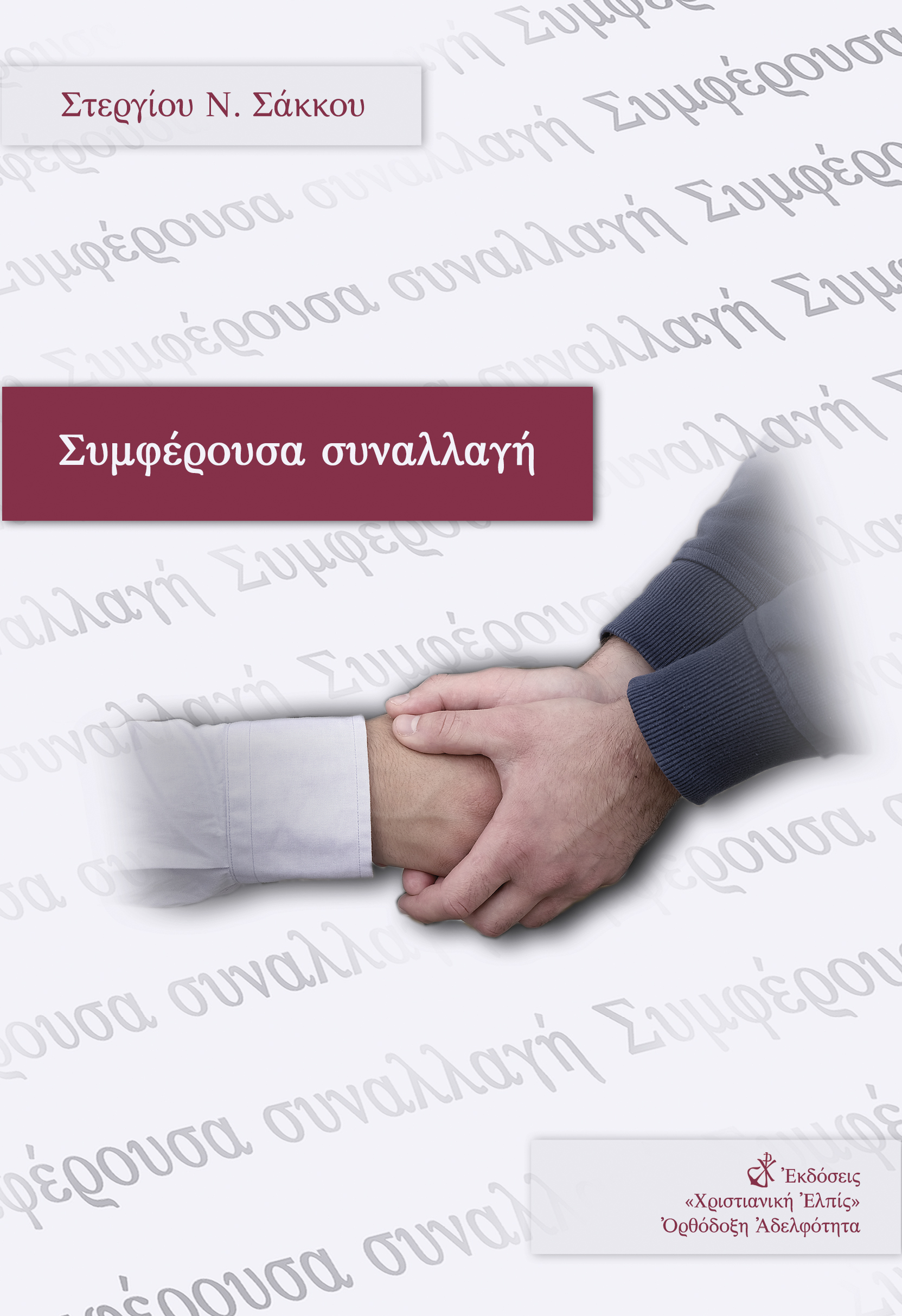
ΣΤΕΡΓΙΟΥ ΣΑΚΚΟΥ
Μέσα στήν πολυτάραχη κοινωνία μας συχνά διασαλεύονται οἱ διαπροσωπικές μας σχέσεις.
Κι εἶναι γεγονός πώς κάθε ἀντιπαράθεση καί σύγκρουση ἀφήνει ἔντονα καί ζωηρά τά ἀποτυπώματά της μέσα μας.
Μποροῦμε νά ἀπαλλαγοῦμε ἀπό αὐτές τίς ἀνεπιθύμητες καταστάσεις; Πῶς;
Αὐθεντικές ἀπαντήσεις στά ἐρωτήματα αὐτά προσφέρει τό νέο αὐτό βιβλίο.
ΖΗΤΗΣΤΕ ΤΟ ΣΤΟ ΒΙΒΛΙΟΠΩΛΕΙΟ "ΑΠΟΛΥΤΡΩΣΙΣ", Γ. Μπακατσέλου 5, Θεσ/νίκη, τηλ. 2310 274518
καί στό ἠλεκτρονικό μας βιβλιοπωλεῖο https://www.apolytrosis-books.gr
Saint Nektarios
Translation from the Book
Ὁ Θεός στήν ἱστορία τῆς Ἐκκλησίας, Βοήθημα Κατωτέρου Κατηχητικοῦ Γ΄,
ἐκδ. «Χριστιανική Ἐλπίς» Ὀρθόδοξη Ἀδελφότητα, Θεσσαλονίκη 2016, σσ. 42-46
A saint of the twentieth century
(November 9th)
Have you ever realized that we might have a saint living among us? You might be wondering how this is possible in our time. Do not think that this is strange. Every age, even ours, has its saints. And these saints move very simply and silently among us, that is why no one realizes their presence immediately.
Saint Nektarios was a simple child. He was the fifth out of six children from a poor family. When he was thirteen years old, in 1859, he left his birthplace, Silivria in eastern Thrace, and went to Constantinople to find work and get educated.
He was a young child, but with strong faith. That is why he was not afraid in the face of difficulties. The merchant, near whom he would work, was suddenly forced to immigrate to a faraway place. Therefore, young Anastasis - that was his baptismal name - could not follow him. Thus, he found himself in the big city alone, unknown among strangers. He was not alone, though. He had an inseparable friend and companion, Jesus Christ, whom he believed in and loved. With His power he could face the problems of life with courage.
He found work in a workshop where he had to stack tobacco balls in large boxes and crates. He had to work from very early in the morning until late at night. Unfortunately, his boss was constantly angry, he was furious at everyone. However, Anastasis did not lose his courage. Every day he did his prayer and started his work with confidence.
And when night came, he had a special joy. He carried out a secret missionary plan that he had come up with: He took separately more than fifty wrappers, in which the boxes with the tobacco were wrapped, and he wrote passages from the Bible and words of the Fathers on them! He had collected such passages in a thick notebook, which he carried with him. He had learned a lot of them by heart, as well. He felt so happy that he could offer them to people! This poor man could donate the most precious pearls! And how wonderful! Ever since Anastasis started this beautiful habit, his work started flourishing. The orders they would get were increasing!
But as winter arrived, poverty hit Anastasis hard. Because of time and effort, his clothes and his shoes were worn out. That year, the winter was heavy, with a lot of snow and endless rains. The child was cold and he suffered terribly. One night, he decided to approach his boss and ask for help. But he looked at him with contempt and spoke sternly to him. He showed no desire to support him.
Anastasis soaked his pillow in tears that night. When he fell asleep for a while, he saw in his dream the omnipotent Christ. He asked him why he was crying, but he could not answer. When he woke up, it was still dawn, so he decided to write a letter. He took a piece of paper and a pencil and wrote: "Christ, you asked me why I was crying. My clothes and my shoes are worn out, my toes have come out and I suffer. I'm cold in the winter now. I went to my boss yesterday and he sent me away ... Christ, what can I do? Forgive me for bothering you. I worship and adore you, your slave Anastasios ". The child with the simple but strong faith put his letter in an envelope and wrote: "For the Lord Jesus Christ". Address: "To heaven".
It was still dawn when he set off for the post office. He had to post other letters, as well. On the way to the post office, he met his neighbor, Mr. Themistoklis, who had a shop with frames opposite his workplace. He was also going to the post office. Seeing Anastasis running with holes in his shoes in the cold morning, he felt sorry for him and was he showed willingness to post his letters, too.
Α week later, Anastasis was in for an unexpected surprise. He received a postal parcel. Sender: Jesus Christ! So, did he receive his letter? And now what does he send him? With trembling hands, full of wonder and emotion Anastasis opened the package. His eyes watered. The package contained brand new clothes and shoes! He fell on his knees and thanked his beloved Christ with tears.
However, his sufferings were not over. His boss, as soon as he saw him well dressed, made some evil thoughts. He thought that Anastasis had stolen his new clothes and shoes, and started beating him mercilessly. "I'm not a thief, I'm not a thief, sir," the child repeated, crying.
The neighbor heard their voices and immediately ran to reveal the truth. He was the "angel" who had sent the parcel on behalf of Christ. He was surprised when he saw the envelope with Jesus Christ and read its contents. Moved by the child's need and fervent prayer, he wanted to give him a present. Nevertheless, Anastasis was in for a second gift by Mr. Themistoklis: He was hired in his shop, to work in better conditions.
After a few years, the little boy grew up. He became a teacher and later a monk, called "Nektarios". He studied at the Theological School of Athens and rose to high ecclesiastical positions in Alexandria, Egypt, until he became bishop of the Diocese of Pentapolis. However, his adventures in life were not over. Some people envied Saint Nektarios and slandered him with numerous false accusations. It is worthwhile to become familiar with his life in more detail, so as to admire the bravery of his soul, his trust in God, and his forbearance. Despite being very poor, and not having to eat for a few days, he did not say a bad word about any of his enemies.
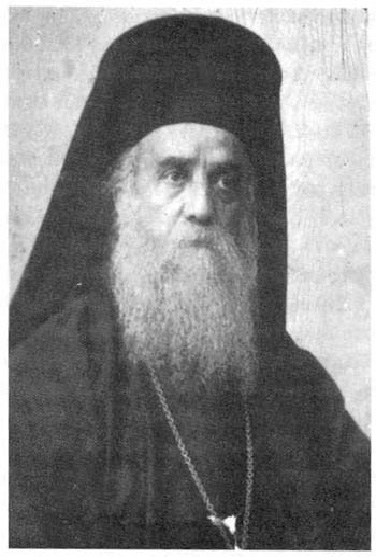 Later, he became director of the Rizarios Ecclesiastical School of Athens. Students there were destined to become theologians or priests. Saint Nektarios preached about faith and love to them. He used to lead by example. One night, he was cleaning the toilets of the school when he was "caught in the act" by the school principal. Why would he do such a thing? Well, the cleaner and his assistant, who constantly quarreled with each other, would often leave the toilets dirty, so Saint Nektarios did the job for them so as not to lose their salaries. His humiliation shocked both of them and they decided to change their behavior.
Later, he became director of the Rizarios Ecclesiastical School of Athens. Students there were destined to become theologians or priests. Saint Nektarios preached about faith and love to them. He used to lead by example. One night, he was cleaning the toilets of the school when he was "caught in the act" by the school principal. Why would he do such a thing? Well, the cleaner and his assistant, who constantly quarreled with each other, would often leave the toilets dirty, so Saint Nektarios did the job for them so as not to lose their salaries. His humiliation shocked both of them and they decided to change their behavior.
Saint Nektarios remained humble until the end of his life, without malice for his enemies. That is why God glorified him. Immediately after his death, on November 9, 1920, the saint began to scent and perform miracles. Today in the island of Aegina a glorious temple has been erected in his name and many pilgrims embrace his holy relics with reverence.
Saint Nektarios is a saint of the twentieth century. A lot of other saints followed: Saint Paisios, Saint Porphyrios, Saint Iakovos, Saint Sophia of Kleisoura. Our world has been constantly sending saints to heaven for centuries now. That's why we said in the beginning that maybe saints walk among us.
What if a lot of people are falling more and more into corruption? There are always the few chosen of God. And they are "the salt of the earth" and "the light of the world" (Mt 5: 13, 14). We put a little salt in the food, but it makes it taste better. And a small candle is enough with its small flame to light the deep darkness. So, the few people of God make the lives of people "tastier" and beautiful and they enlighten the world with the light of hope. May all of us, with the help of Saint Nektarios and the desire to "become a saint" in our hearts, believe and love Christ with all the power of our hearts! Amen.
Copyright © 2021 by Orthodox Christian Association «ΧΡΙΣΤΙΑΝΙΚΗ ΕΛΠΙΣ» ΟΡΘΟΔΟΞΗ ΑΔΕΛΦΟΤΗΤΑ. All rights reserved.
Paul the Apostle
Translation from the Book
Ὁ Θεός στήν ἱστορία τῆς Ἐκκλησίας, Βοήθημα Κατωτέρου Κατηχητικοῦ Γ΄,
ἐκδ. «Χριστιανική Ἐλπίς» Ὀρθόδοξη Ἀδελφότητα, Θεσσαλονίκη 2016, σσ. 12-17
Do you know any other great apostle of Christ besides the Twelve Apostles? Apostle Paul! 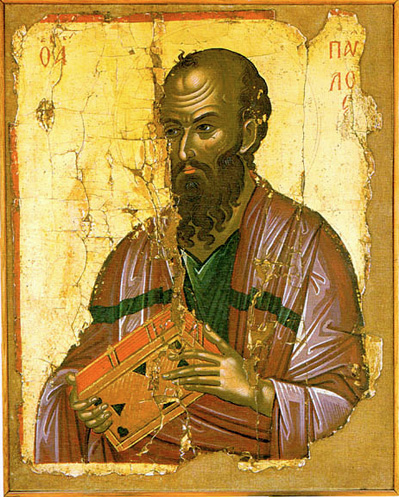 Do you know who was Paul before he met Christ? He was a fierce persecutor of Christians! He entered Christian houses, grabbed men and women and sent them to prison. Everyone was afraid and terrified because of him. He chased Christians not only in Jerusalem but also in other cities. He aimed to drag them all in chains to Jerusalem, leave none free.
Do you know who was Paul before he met Christ? He was a fierce persecutor of Christians! He entered Christian houses, grabbed men and women and sent them to prison. Everyone was afraid and terrified because of him. He chased Christians not only in Jerusalem but also in other cities. He aimed to drag them all in chains to Jerusalem, leave none free.
Why so much hatred? What Christ and His students were to be blamed for? Paul was a pure Jew. He loved God, he studied the Old Testament and he followed precisely its law. When he heard about Jesus, he thought that a new religion had emerged, which misled Jews from the worship of the real God. This infuriated him! He wished to eradicate Jesus's name and exterminate His followers.
His actions were as a result of his zeal for the real God and his ignorance, so God did not leave him in the dark for long. He opened the eyes of his soul in a wondrous way.
Paul was on his way to Damascus in Syria in order to arrest Christians. As he was approaching to the city, suddenly a light from the sky shone brightly around him. Dazzled and blinded he fell down. While he was lying on the ground he heard a voice; "Saul Saul why are you chasing me? (Saul was his Hebrew name and Paul his roman one). Who is talking to him? Where is the voice coming from?
- "Who are you Lord?", startled Paul asked.
- "I am Jesus whom you are chasing", the Unknown's voice replied. "Stand up and go to Damascus where you shall find what you have to do."
The men of his company were also startled! They heard the voice but they could see nobody! When Paul stood up, his eyes were open but he couldn't see. His escort guided him by holding his hand until they reached Damascus. There he stayed for three days and three nights without being able to see. He neither ate nor drank anything.
A pious Christian, named Ananias lived in Damascus. He received Christ's command to go to meet Paul and cure him. Ananias was hesitant at first.
- My Lord I have heard a lot about this man. Christians of Jerusalem have suffered immensely due to him! He came here with the same purpose, to bring bound to Jerusalem those who believe in You.
- Go Ananias, the Lord replied, for I have chosen him to preach my gospel to heathens as well.
Indeed, Ananias went to the house where Paul was staying. He put his hands on him and said; "Saul, my brother, Jesus who revealed Himself to you on your way, sent me to you so that your vision is restored and you receive the Holy Spirit". Then something like scales fell off Paul's eyes! He could see! More importantly, he could see more clearly with the eyes of his soul that Christ was the real God. He was then baptized and he became a fiery apostle of Christ.
He started preaching immediately. He went to the synagogues, places where Jews gathered to study the Old Testament, and he explained that Jesus is the Messiah whom prophets spoke of, using unarguable points. He confirmed Jesus is the Son of God.
Everybody was surprised. "Isn't this man the fearsome prosecutor of Christians?" they wondered. Fanatic Jews even came up with a devious plan to kill him. They put guards at the gates of Damascus and waited for him to cross in order to kill him!
Some Christians found out about this plan. For this reason, they lowered Paul down from the walls of Damascus, hidden in a big basket! Paul left Damascus and returned to Jerusalem.
There fanatic Jews sought again to kill him. Therefore, Christians helped him escape and he found refuge in his hometown Tarsus.
What did Paul do after this adventure? Was he scared? Did he cower in some corner and was silenced? No! Be proud of how the fiery apostle threw himself in the missionary work!
From place to place, from town to town he speaks of Christ and His Resurrection. Think of the fact that there weren't advanced means of transportation at his time. He travels on foot for uncountable kilometers! He walks across dirt roads, over mountains and across the coast side. He doesn't spare fatigue or the threats against his life. In Lystra he is stoned and almost killed. The moment some Christians helped him up, he continued his mission with his wounds still open! Nothing could restrain him. He had only one wish, burning in his heart; to preach the Gospel to the whole world! Indeed he managed to preach not only in Palestine and several cities in Asia, but he also crossed seas, he reached Cyprus, Greece and even Rome, the capital of the Roman Empire. In other words, he traversed the whole known world of that era.
Do you know where he preached in Greece? In Philippi, Thessaloniki, Veria, Athens, Corinth. He is the apostle of Greece! He was the first to bring the light of the Gospel and destroy the darkness of idolatry. In this wondrous work he had valuable partners, his student Timothy, the evangelist Luke, Silas and others.
While he was touring the world, he was writing letters and epistles to Christians who lived in the cities he had passed or to his students, giving advice, resolving problems and answering questions. 14 Epistles are included in the New Testament, written under the influence of the Holy Spirit. Among them there are the Epistle to the Phillipians, two Epistles to the Thessalonians and two to the Corinthians.
Mission
Paul the apostle dedicated his life to a great cause; preaching the Gospel of Christ everywhere. Wherever he went he was the mouth of Christ.
Nowadays God is searching for children - not adults only- to give them this sacred mission too; to become His mouth, to carry His words, His truth, His light to all the people who don't know Him.
There are kids in your school who know very few about Christ and His Gospel. There are people in your neighborhood, maybe even in your family, among your relatives who don't go to church, don't read the Holy Scripture, don't pray. Who will talk to them about Christ? Who will show them the right path?
God is searching. Will he find children who love Him to start a mission?
♦ To invite other kids to come to the Sunday school.
♦ To bring younger and older people to the church on Sunday.
♦ To give advise using Christ's words.
♦ To encourage others to read the Holy Scripture.
♦ To introduce a Christian magazine, to give a gift a Christian book.
Το not rest unless they guide a soul towards Christ! Children who love Christ ask at their prayers; "Christ, please help me bring a soul closer to You!"
Mission is the biggest benefaction. A former heathen who got baptized said; "If I am found worthy to go to heaven, firstly I will run and kneel before Christ for saving me with His sacrifice on the Cross. Immediately after, I will run and kiss the hands of the missionary who talked to me about Christ. He is my greatest benefactor since he is the person who introduced me to Christ my redeemer!"
Imagine ourselves being able to offer such a great benefaction; to help people learn about Christ! Is there something else that can manage to give us more happiness than that?
Paul the Apostle of Christ
you spread His Word worldwide
His sacred message nowadays
please help me assert likewise!
Copyright © 2021 by Orthodox Christian Association «ΧΡΙΣΤΙΑΝΙΚΗ ΕΛΠΙΣ» ΟΡΘΟΔΟΞΗ ΑΔΕΛΦΟΤΗΤΑ. All rights reserved.







